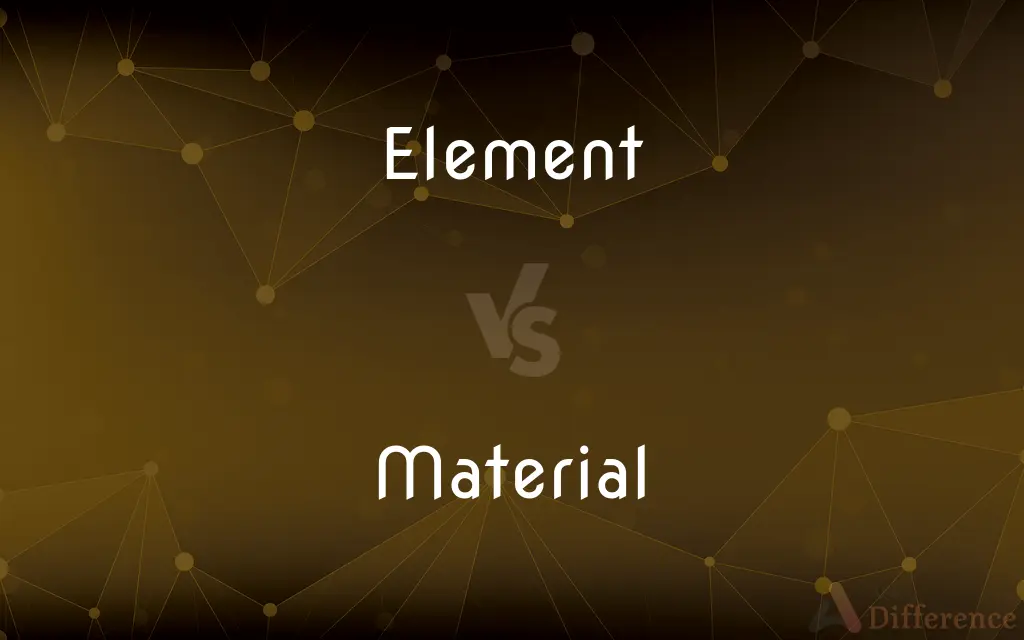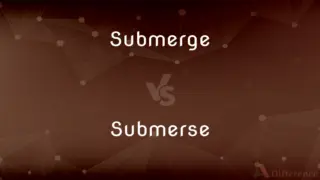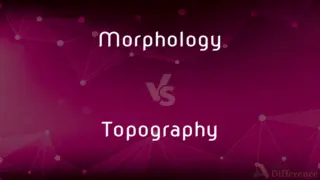Element vs. Material — What's the Difference?
Edited by Tayyaba Rehman — By Fiza Rafique — Updated on May 20, 2024
An element is a pure substance consisting of one type of atom, while a material is any substance composed of elements or compounds used to make objects or structures.

Difference Between Element and Material
Table of Contents
ADVERTISEMENT
Key Differences
An element is a fundamental substance that cannot be broken down into simpler substances by chemical means. Elements are defined by the number of protons in their atoms, known as the atomic number. For example, gold is an element with the atomic number 79. On the other hand, a material is a substance composed of one or more elements or compounds and is used in manufacturing and construction. Materials can be natural, like wood or stone, or synthetic, like plastic or steel.
Elements are the building blocks of matter and are listed in the periodic table. They can exist as individual atoms or molecules, such as oxygen (O2) and nitrogen (N2), which are essential for life. Materials are often classified by their physical properties and uses. Metals, ceramics, polymers, and composites are types of materials. Each type has distinct properties that make it suitable for specific applications.
While elements are pure substances with a defined atomic structure, materials can be complex mixtures with various properties tailored for particular purposes. For instance, alloys are materials made by combining different metals to enhance strength or corrosion resistance.
Elements have a fixed composition and unique chemical behavior, whereas materials may undergo processing to achieve desired characteristics. For example, glass is a material made from elements like silicon and oxygen, processed to create transparent and durable products.
The study of elements falls under chemistry, focusing on their reactions and compounds. In contrast, materials science involves understanding and manipulating materials to develop new technologies and applications.
ADVERTISEMENT
Comparison Chart
Definition
Pure substance with one type of atom
Substance made from elements/compounds
Composition
Single type of atom
One or more elements or compounds
Existence
Individual atoms or molecules
Natural or synthetic forms
Classification
Based on atomic number (Periodic Table)
Based on physical properties and uses
Study Field
Chemistry
Materials Science
Compare with Definitions
Element
A substance that cannot be chemically broken down.
Oxygen is an essential element for respiration.
Material
Substance used to make things.
Steel is a strong material used in construction.
Element
Pure substance with one type of atom.
Gold is a valuable element used in jewelry.
Material
Classified by properties.
Ceramics are brittle materials resistant to heat.
Element
Fundamental part of matter.
Carbon is a key element in organic chemistry.
Material
A material is a substance or mixture of substances that constitutes an object. Materials can be pure or impure, living or non-living matter.
Element
Distinct atomic number.
Helium is the second element on the periodic table.
Material
The substance or substances out of which a thing is or can be made.
Element
A fundamental, essential, or irreducible constituent of a composite entity.
Material
Something, such as an idea or information, that is to be refined and made or incorporated into a finished effort
Material for a comedy.
Element
Elements The basic assumptions or principles of a subject.
Material
Materials Tools or apparatus for the performance of a given task
Writing materials.
Element
A member of a set.
Material
Yard goods or cloth.
Element
A point, line, or plane.
Material
A person who is qualified or suited for a position or activity
The members of the board felt that she was vice-presidential material.
Element
A part of a geometric configuration, such as an angle in a triangle.
Material
Of, relating to, or composed of matter.
Element
The generatrix of a geometric figure.
Material
Of, relating to, or affecting physical well-being; bodily
"the moral and material welfare of all good citizens" (Theodore Roosevelt).
Element
Any of the terms in the rectangular array of terms that constitute a matrix or determinant.
Material
Of or concerned with the physical as distinct from the intellectual or spiritual
"Great men are they who see that spiritual is stronger than any material force, that thoughts rule the world" (Ralph Waldo Emerson).
Element
Chemistry & Physics A substance composed of atoms having an identical number of protons in each nucleus. Elements cannot be reduced to simpler substances by normal chemical means. See Periodic Table.
Material
Being both relevant and consequential; crucial
Testimony material to the inquiry.
Element
One of four substances, earth, air, fire, or water, formerly regarded as a fundamental constituent of the universe.
Material
(Philosophy) Of or relating to the matter of reasoning, rather than the form.
Element
(Electricity)The resistance wire in an electrical appliance such as a heater or an oven.
Material
Having to do with matter; consisting of matter.
This compound has a number of interesting material properties.
Element
Elements The forces that constitute the weather, especially severe or inclement weather:outside paint that had been damaged by the elements.
Material
Worldly, as opposed to spiritual.
Don't let material concerns get in the way of living a happy life.
Element
An environment naturally suited to or associated with an individual:He is in his element when traveling. The business world is her element.
Material
Significant.
You've made several material contributions to this project.
This is the most material fact in this lawsuit.
Element
A distinct group within a larger community:the dissident element on campus.
Material
Matter which may be shaped or manipulated, particularly in making something.
Asphalt, composed of oil and sand, is a widely used material for roads.
Element
A ground unit in an air force comparable to a platoon.
Material
Text written for a specific purpose.
We were a warm-up act at the time; we didn't have enough original material to headline.
Element
A unit of an air force equal to two or three aircraft.
Material
A sample or specimens for study.
Element
Elements The bread and wine of the Eucharist.
Material
Cloth to be made into a garment. Fabric.
You'll need about a yard of material to make this.
Element
One of the simplest or essential parts or principles of which anything consists, or upon which the constitution or fundamental powers of anything are based.
Letters are the elements of written language.
Material
A person, or people collectively, who are qualified for a certain position or activity.
Boy/girlfriend material
Marriage material
We have lots of presidential material in various public offices.
Element
(chemistry) Any one of the simplest chemical substances that cannot be decomposed in a chemical reaction or by any chemical means and made up of atoms all having the same number of protons.
Material
Related data of various kinds, especially if collected as the basis for a document or book.
Element
One of the four basic building blocks of matter in theories of ancient philosophers and alchemists: water, earth, fire, and air.
Material
The substance that something is made or composed of.
Element
A basic, simple substance out of which something is made, raw material.
Material
(chess) All of a player's pieces and pawns on the chessboard.
Element
(legal) A required aspect or component of a cause of action. A deed is regarded as a violation of law only if each element can be proved.
Material
To form from matter; to materialize.
Element
(set theory) One of the objects in a set.
Material
Consisting of matter; not spiritual; corporeal; physical; as, material substance or bodies.
The material elements of the universe.
Element
(mathematics) One of the entries of a matrix.
Material
Pertaining to, or affecting, the physical nature of man, as distinguished from the mental or moral nature; relating to the bodily wants, interests, and comforts; as, material well-being; material comforts.
Element
Any of the teeth of a zip fastener.
Material
Of solid or weighty character; not insubstantial; of consequence; not be dispensed with; important; significant.
Discourse, which was always material, never trifling.
I shall, in the account of simple ideas, set down only such as are most material to our present purpose.
Element
A small part of the whole.
An element of the picture
Material
Pertaining to the matter, as opposed to the form, of a thing. See Matter.
Element
A small but present amount of a quality, a hint.
An element of doubt
Material
The substance or matter of which anything is made or may be made.
Element
A factor, one of the conditions contributing to a result.
Material
To form from matter; to materialize.
Element
(obsolete) The sky.
Material
The tangible substance that goes into the makeup of a physical object;
Coal is a hard black material
Wheat is the stuff they use to make bread
Element
(obsolete) Any one of the heavenly spheres believed to carry the celestial bodies.
Material
Information (data or ideas or observations) that can be used or reworked into a finished form;
The archives provided rich material for a definitive biography
Element
Atmospheric forces such as strong winds and rains.
Exposed to the elements
Material
Things needed for doing or making something;
Writing materials
Useful teaching materials
Element
A place or state of being that an individual or object is best suited to.
To be in one's element
Material
Artifact made by weaving or felting or knitting or crocheting natural or synthetic fibers;
The fabric in the curtains was light and semitraqnsparent
Woven cloth originated in Mesopotamia around 5000 BC
She measured off enough material for a dress
Element
The bread and wine taken at Holy Communion.
Material
A person judged suitable for admission or employment;
He was university material
She was vice-presidential material
Element
A group of people within a larger group having a particular common characteristic.
You sometimes find the hooligan element at football matches.
Material
Concerned with worldly rather than spiritual interests;
Material possessions
Material wealth
Material comforts
Element
(in the plural only) The basic principles of a field of knowledge, basics, fundamentals, rudiments.
Material
Derived from or composed of matter;
The material universe
Element
A component in electrical equipment, often in the form of a coil, having a high resistance, thereby generating heat when a current is passed through it.
The element in this electric kettle can heat the water in under a minute.
Material
Directly relevant to a matter especially a law case;
His support made a material difference
Evidence material to the issue at hand
Facts likely to influence the judgment are called material facts
A material witness
Element
(mathematics) An infinitesimal interval of a quantity, a differential.
The element of area in Cartesian coordinates is dx dy.
Material
Concerned with or affecting physical as distinct from intellectual or psychological well-being;
Material needs
The moral and material welfare of all good citizens
Element
(astronomy) An orbital element; one of the parameters needed to uniquely specify a particular orbit.
Material
Having material or physical form or substance;
That which is created is of necessity corporeal and visible and tangible
Element
(computing) One of the conceptual objects in a markup language, usually represented in text by tags.
Material
Having substance or capable of being treated as fact; not imaginary;
The substantial world
A mere dream, neither substantial nor practical
Most ponderous and substantial things
Element
(obsolete) To compound of elements.
Material
Composed of elements or compounds.
Plastic is a versatile material made from petrochemicals.
Element
(obsolete) To constitute and be the elements of.
Material
Natural or synthetic.
Wood is a natural material, while nylon is synthetic.
Element
One of the simplest or essential parts or principles of which anything consists, or upon which the constitution or fundamental powers of anything are based.
Material
Subject to processing.
Glass is a transparent material made from sand and other elements.
Element
One of the ultimate, undecomposable constituents of any kind of matter. Specifically: (Chem.) A substance which cannot be decomposed into different kinds of matter by any means at present employed; as, the elements of water are oxygen and hydrogen.
Element
One of the ultimate parts which are variously combined in anything; as, letters are the elements of written language; hence, also, a simple portion of that which is complex, as a shaft, lever, wheel, or any simple part in a machine; one of the essential ingredients of any mixture; a constituent part; as, quartz, feldspar, and mica are the elements of granite.
The simplicity which is so large an element in a noble nature was laughed to scorn.
Element
One out of several parts combined in a system of aggregation, when each is of the nature of the whole; as, a single cell is an element of the honeycomb.
Element
One of the simplest essential parts, more commonly called cells, of which animal and vegetable organisms, or their tissues and organs, are composed.
Element
An infinitesimal part of anything of the same nature as the entire magnitude considered; as, in a solid an element may be the infinitesimal portion between any two planes that are separated an indefinitely small distance. In the calculus, element is sometimes used as synonymous with differential.
Element
One of the necessary data or values upon which a system of calculations depends, or general conclusions are based; as, the elements of a planet's orbit.
Element
The simplest or fundamental principles of any system in philosophy, science, or art; rudiments; as, the elements of geometry, or of music.
Element
Any outline or sketch, regarded as containing the fundamental ideas or features of the thing in question; as, the elements of a plan.
Element
One of the simple substances, as supposed by the ancient philosophers; one of the imaginary principles of matter.
Of elementsThe grosser feeds the purer: Earth the Sea;Earth and the Sea feed Air; the Air those FiresEthereal.
Does not our life consist of the four elements?
And the complexion of the element [i. e.,the sky or air]In favor's like the work we have in hand,Most bloody, fiery, and most terrible.
About twelve ounces [of food], with mere element for drink.
They show that they are out of their element.
Element
The conditions and movements of the air.
Element
The whole material composing the world.
The elements shall melt with fervent heat.
Element
The bread and wine used in the eucharist or Lord's supper.
Element
To compound of elements or first principles.
Element
To constitute; to make up with elements.
His very soul was elemented of nothing but sadness.
Element
An abstract part of something;
Jealousy was a component of his character
Two constituents of a musical composition are melody and harmony
The grammatical elements of a sentence
A key factor in her success
Humor: an effective ingredient of a speech
Element
Any of the more than 100 known substances (of which 92 occur naturally) that cannot be separated into simpler substances and that singly or in combination constitute all matter
Element
An artifact that is one of the individual parts of which a composite entity is made up; especially a part that can be separated from or attached to a system;
Spare components for cars
A component or constituent element of a system
Element
One of four substances thought in ancient and medieval cosmology to constitute the physical universe;
The alchemists believed that there were four elements
Element
The most favorable environment for a plant or animal;
Water is the element of fishes
Element
The situation in which you are happiest and most effective;
In your element
Element
A straight line that generates a cylinder or cone
Element
Basic building block of compounds.
Sodium is an element that reacts with chlorine to form salt.
Common Curiosities
Can an element be a material?
Yes, an element can be used as a material if it has practical applications, like gold in jewelry.
What is a material?
A material is any substance composed of elements or compounds used to create objects or structures.
What field studies materials?
Materials science studies materials and their properties.
What is an element?
An element is a pure substance made of only one type of atom, with a unique atomic number.
What field studies elements?
Chemistry studies elements and their reactions.
What is the main difference between an element and a compound?
An element consists of one type of atom, while a compound consists of two or more elements chemically bonded.
Why are materials important in engineering?
Materials determine the durability, strength, and functionality of engineered products.
Can elements exist in different forms?
Yes, elements can exist in different forms, such as carbon in graphite and diamond.
How are elements classified?
Elements are classified by their atomic number in the periodic table.
How are materials classified?
Materials are classified by their physical properties, such as metals, ceramics, polymers, and composites.
Are all materials made of elements?
Yes, all materials are composed of elements or compounds derived from elements.
Can materials be natural and synthetic?
Yes, materials can be natural, like wood, or synthetic, like plastic.
How do processing methods affect materials?
Processing methods can enhance the properties of materials, like making glass from sand.
Why are elements important in chemistry?
Elements are the basic building blocks of all matter, essential for understanding chemical reactions.
What are alloys?
Alloys are materials made by combining two or more metals.
Share Your Discovery

Previous Comparison
Submerge vs. Submerse
Next Comparison
Morphology vs. TopographyAuthor Spotlight
Written by
Fiza RafiqueFiza Rafique is a skilled content writer at AskDifference.com, where she meticulously refines and enhances written pieces. Drawing from her vast editorial expertise, Fiza ensures clarity, accuracy, and precision in every article. Passionate about language, she continually seeks to elevate the quality of content for readers worldwide.
Edited by
Tayyaba RehmanTayyaba Rehman is a distinguished writer, currently serving as a primary contributor to askdifference.com. As a researcher in semantics and etymology, Tayyaba's passion for the complexity of languages and their distinctions has found a perfect home on the platform. Tayyaba delves into the intricacies of language, distinguishing between commonly confused words and phrases, thereby providing clarity for readers worldwide.











































